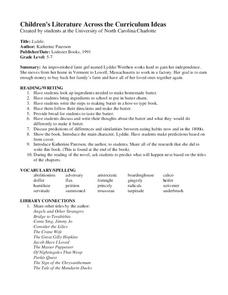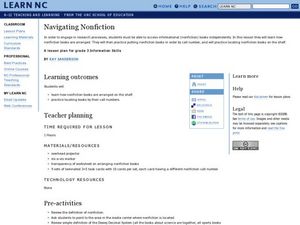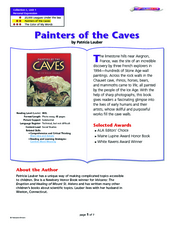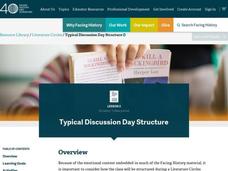Digital Public Library of America
Teaching Guide: Exploring To Kill a Mockingbird
Harper Lee's To Kill a Mockingbird, considered by many to be a seminal piece of American literature, contains many complex literary themes that carry through United States history. Use a series of discussion questions and classroom...
Education World
Edible Resource Maps!
Young scholars discuss resource maps and examine examples from library resources. Working in groups, they create edible resource maps by drawing examples, such as popcorn on the border of Iowa and Nebraska. Then they use cookies in the...
GCFGlobal.org
Office: Working with Icons
Discover a great way to add graphics to a digital project by using Microsoft Office's Icons feature. Using a helpful lesson viewers discover a library of professional graphics at their disposal. They learn how to scroll through a wide...
Curated OER
Civil War Photographs: What Do You See?
A study of an image from The Library of Congress collection Civil War Photographs 1861-1865 launches an investigation of the connection between the Civil War and American industrialization. After analyzing “Petersburg, Va. The...
Curated OER
CCC: Credible sources, Creative Commons Images, and Citing Your Sources
As part of a unit devoted to the study of autobiographies, this one-day library session focuses on developing research skills. Class members locate and properly cite a sketch of a Creative Commons image, as well as record the call...
Curated OER
Obesity
Class members participate in a discussion, read a newspaper article, and participate in activities meant to open their eyes to the problem of obesity in the US. There are resource links, electronic worksheets, and teacher's notes to help...
Curated OER
Lyddie
Students investigate the character trait of perseverance and how it is used to help a girl gain independence in a fictional story. The story also has them think about the value of relationships and then write reflectively about...
Curated OER
How to Locate and Evaluate Information, Part III - Internet Sites
This is the third in a series of lessons scaffolding the research paper. It purports to teach researchers how to evaluate internet sites, but the lack of links, specific criteria, or site evaluation rubrics would require additional...
Curated OER
Formatting Fun
Launch this lesson by saving the provided Formatting Fun template on your classroom or library computers. Young learners can then practice formatting basics for use in writing activities. Exercises include practice in highlighting text,...
Curated OER
100 Questions
Gather around to play a game! Middle and high schoolers answer questions (provided here) using various reference materials. Bring encyclopedias and other reference materials to class, as each group has limited Internet access! An answer...
Curated OER
How to Research and Write an Essay
Research and write a 500-word essay. Pupils research a topic and write an essay based on their research. They use the given directions and examples to help them research, organize, format, and write their essay. There's a short chart...
Curated OER
Calculator Puzzle Patterns
It's no secret that being able to competently use a calculator is an important skill. In this math lesson, young mathematicians learn how to use the counting constant function on their calculators to explore patterns and relationships...
Curated OER
Navigating Nonfiction
Third graders explore the arrangement of nonfiction. In this library skills instructional activity, 3rd graders examine Dewey Decimal classification as they collaborate to locate nonfiction materials in the library/media center.
Curated OER
Julie of the Wolves
Have your class practice their comprehension skills using this resource. After reading Julie of the Wolves by Jean Craighead George, learners engage in cause and effect activities, identify story elements and figurative language, and...
Curated OER
Painter of the Caves
What a great lesson! Learners read a story called Painters of the Caves by Patricia Lauber which discusses Stone Age wall paintings in Avignon, France. There is a series of discussion questions, comprehension questions, and a graphic...
Curated OER
Site and Situation: Right Place at the Right Time
Learners analyze geographic details. In this research skills lesson, students research maps as well as primary and secondary sources to analyze growth, population, and manufacturing in Altoona, Pennsylvania following World...
Facing History and Ourselves
Analyzing Historical Evidence
High schoolers examine World War I war crimes. In this world history instructional activity, high schoolers use primary and secondary sources to research and understand the systematic nature of the Armenian Genocide. High schoolers...
Curated OER
Literature Circles: Typical Discussion Day Structure
Tenth graders practice and facilitate a discussion. In this literature lesson, 10th graders practice using effective discussion strategies. Students participate in reflection and self-assessment on their own discussion...
Curated OER
Comparison/Contrast Composer Study
Pupils choose two composers to research and complete a compare and contrast study of them. In this composer research lesson plan, students select two composers to research. Pupils use Internet sources, the library, and music class...
Curated OER
Inference
Making inferences about what you read is an important skill for both elementary, middle, and high school learners. Focusing on events which occurred during World War II, they answer a series of questions related to what we can infer as...
Curated OER
Librarian, Legacy Keeper
Students brainstorm a list of all the kinds of items kept in a library. They answer questions about the job of a librarian then they write a three-paragraph essay about the work of a librarian.
Curated OER
Sorting
A lesson plan on classification and sorting is here for you. Elementary schoolers participate in an interactive computer game in which they sort books by theme. They take a trip to the library to observe and discuss how books are sorted,...
Curated OER
Getting to Know Numbers
Learners study the math concepts associated with the calendar including days of the week, months of the year, odd/even numbers and numbers which come before and after. They use handheld computers with the appropriate software.
University of Pennsylvania
Decoding Propaganda: J’Accuse…! vs. J’Accuse…!
Reading snail mail is a great way to go back into history and to understand others' points of view. The resource, the second in a five-part unit, covers the Dreyfus Affair. Scholars, working in two different groups, read one letter and...
Other popular searches
- Library Skills Lesson Plans
- Library Skills Elementary
- Smart Board Library Skills
- Teaching Library Skills
- Library Skills Quizzes
- Library Skills Videos
- Library Skills Grade 7
- Library Skills Plan
- Library Skills and Esl
- December Library Skills
- Research Skills Library
- Library Skills Book Choice























